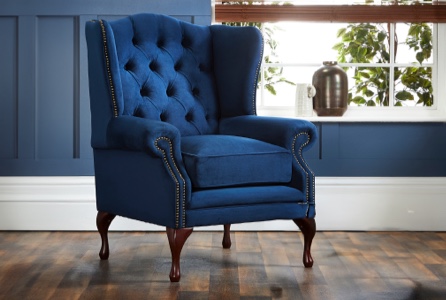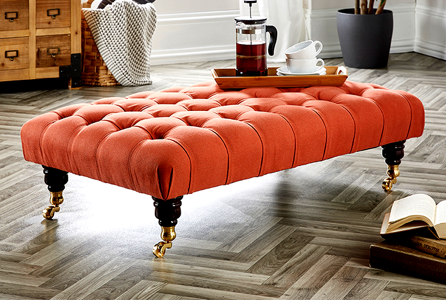Interiors Trends and Tips
Get Organised with Cory Cook: Part Two
If you’re an organisation fiend, you no doubt caught the first part of our interview with Vegas-born, London-based Cory Cook here on the blog. In the post, Cory shares some of her top tips for keeping your home ship shape, and today she’s here to share with us even more hints and tips.
So, kick off your shoes (but remember to tidy them away!), put the kettle on and settle down to catch up with the second part of our interview. Take it away, Cory…
Distinctive Chesterfields (DC): Aside from the more obvious (being organised, efficient etc.), what would you say are the top three skills/personality traits someone who wants to follow your footsteps as a professional organiser needs?
Cory: 1 Patience – Everyone works at a different pace. While you may blaze through a bookcase or wardrobe with one person, someone else may need to carefully consider each and every item. A professional organiser will, to a degree, set a working pace, but it must be at a speed that gives a client a level of comfort.
2 Adaptability – Just because your paper filing system worked a treat for your last client, doesn’t mean the next person will think the same way. It’s important to remain open to adapt systems for each individual.
3 Ability to avoid assumptions – No matter what a situation looks like, it’s important to be a great listener before anything else. Never assume anything.
DC: You’ve had the pleasure and experience of working with some pretty big companies (including Las Vegas’ MGM Grand Hotel), but which do you prefer – working with corporate companies, or overhauling someone’s home? And how do the two differ from a professional point of view?
Cory: I suppose the biggest difference for me, which makes overhauling someone’s home perhaps more desirable, is that the impact of my work feels more direct and personal in someone’s home. I loved my roles contributing towards the big picture in larger companies, like the MGM Grand and USA TODAY. However in contrast, organising is more of a personal one-to-one service which I find very enriching. It’s not just about improving someone’s environment, but also changing how they think. Everything we do in a home or work space is immediately noticeable, whereas in a company the results aren’t always quite as tangible. Plus I love the mix and variety from one project to the next. Knowing your true ability is important, and I find that in my current role I’m able to best utilise those skills.
Above: Las Vegas’ MGM Grand hotel
DC: You’ve been fortunate enough to work both in the US and here in the UK. Have you found that there’s any noticeable differences between how people in the UK organise their life, compared to professionals in the US?
Cory: One noticeable difference is the lack of built-in storage space in UK housing compared to the US. When emigrating from America it can be a shock when all your boxes arrive and you wonder where on earth all your things will go.
Plus, US homes tend to have more space in general. In the UK, we often need to be more creative in terms of space management, such as investing in furniture that doubles as storage or, say, transforming the unused space under a staircase into a mini home office.
Another difference is in bringing in help. Culturally speaking, people in the US tend to be quite open about needing – and asking – for help to get organised, whereas in the UK I find there’s still a lingering mindset that one should be able to do it themselves. And I do appreciate this goes back several years. Fortunately awareness is on the rise that if someone needs help in paring down their belongings and becoming more organised for better living, there are people to help them do just that.
One client told me at the end of one session, that she couldn’t believe it had only taken us one day to organise a particular room. She had lived with it that way for eight years before she called.
“One client told me she couldn’t believe it had only taken us one day to organise a particular room.”
DC: What’s been a personal career highlight, and where do you see your business in five years’ time?
Cory: My greatest career highlight was probably taking the leap from a thirteen-year career with USA TODAY to launch my own business. It marked a bold career change for me, but since I opened the doors of my professional organising and time management business, I haven’t looked back.
My business in five years’ time? I surmise no less than world domination of course, ha ha! Plans over the next five years likely include a series of workshops, books, videos, and potentially some TV appearances as homes and interiors programmes become more and more popular.
DC: Do you think that a ‘disorganised’ person has the ability to become more organised in time, or is it a personality trait that’s difficult to ‘reset’ as it were?
Cory: Absolutely. I believe becoming organised, much like time management, is a skill that can be learned. It does require some effort, so it’s important that a person truly wants to become more organised, or has a compelling reason. Even those who consider themselves extremely ‘disorganised’ have the capacity for organisation whether they realise it or not. For example, it could be a single item that no matter what, they know where it is, e.g. a pair of scissors that without fail is always in the same drawer. It’s a matter of incrementally applying this small example on a larger scale to organise other areas.
The trick in making changes is to start small. Work with one new habit until it becomes routine before adding another. Remember, becoming organised is a process, not an event.
“…becoming organised is a process, not an event”
DC: Finally, what are the first things people notice as a result of using your service? And what is it that brings them back to you again? (i.e. ‘more time’, ‘less stress’).
Cory: Here are some of initial reactions I hear from my clients: “I can’t believe how much we were able to get done in a relatively short period of time.” “Oh my goodness, I can see my counter top.” “There it is, I’ve been looking for that for ages!”
People also seem surprised to find they can let go of much more than they thought. It’s like suddenly having permission to let go of the stuff that’s bothered them for a long time, and that’s very liberating. Yes, I believe what brings clients back has a lot to do with minimising stress. Having worked with me before, they’ll have already experienced turning an overwhelming situation into into calm and order. So when they call me back it’s usually to replicate what we did before in another area. There’s an established mutual trust so they know what they’ll be getting.
Thanks very much to Cory for taking time out of her busy schedule to speak to us. Keep your eyes peeled for more of the same here on the blog; don’t forget to bookmark our page and come and say hello on Facebook.










